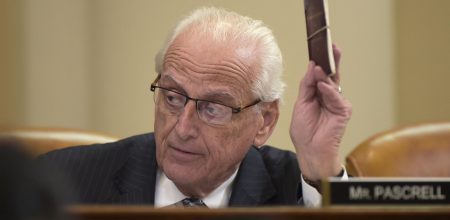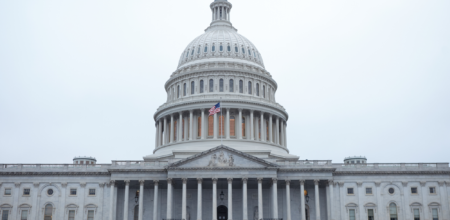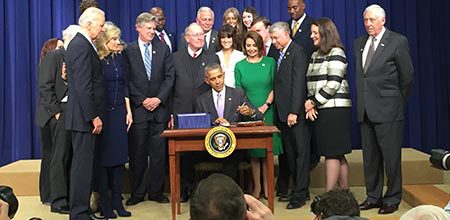Public Policy and Advocacy Update
Categories: Brain Injury, Research
By Susan L. Vaughn, Policy Consultant, Brain Injury Association of America
Since the last issue of The Challenge!, President Joe Biden has released his budget proposals for fiscal year 2024 spending; Congress has passed legislation to lift the debt ceiling, albeit with caps for future spending; and legislators have introduced bills relating to concussions, caregivers, and other issues impacting individuals with brain injury.
On May 11, the President ended the Public Health Emergency implemented due to the COVID-19 pandemic and states have begun unwinding Medicaid provisions relating to eligibility that were implemented during the pandemic. The President has asked state governors to slow down the process as millions are now losing health care coverage.
While the President’s budget normally kicks off the appropriations process, legislation to raise the debt ceiling has consumed much of the work of the current Congress. On June 3, President Biden signed the Fiscal Responsibility Act of 2023 to avoid a default on the nation’s debt, but not without concessions to rein in future spending. The legislation approved a $31.4 trillion debt limit until January 2025 to allow the government to borrow unlimited sums to pay its debts. The agreement caps nondefense spending for fiscal year 2024, then increases funding by 1 percent in 2025. Nondefense spending refers to annual appropriations that fund non-entitlement programs such as research, public education, and disability and health related programs.
Congressional Brain Injury Task Force (CBITF) co-chairs, Reps. Bill Pascrell, Jr. (D-N.J.) and Don Bacon (R-Neb.) circulated a letter to enlist support for increased TBI funding that was sent to House appropriators. Nearly 30 Representatives signed on in support. Sen. Chris Van Hollen (D-Md.) circulated a similar letter in the Senate.
Workforce and Caregivers
Both Congress and the President have highlighted the need for long-term care options for persons with disabilities and the elderly that will allow them to live in their established communities. In April, President Biden issued an Executive Order directing federal agencies to look at policies and ways to improve and connect family caregivers to resources, including veterans and military families caring for members who sustain injury or illness in the line of duty. In March, the Senate Special Committee on Aging, chaired by Sen. Bob Casey, Jr. (D-Pa.), held the hearing “Uplifting Families, Workers, and Older Adults: Supporting Communities of Care” to discuss the caregiving workforce that supports seniors and individuals with disabilities so they may live in their homes and communities. Legislation addressing these issues include:
- H.R. 3706, reintroduced in May by Rep. Barbara Lee (D-Calif.) to expand and enhance existing adult day programs for younger people with neurological diseases or conditions to support and improve access to respite services for family caregivers.
- S. 1298, the Supporting Our Direct Care Workforce and Family Caregivers Act, introduced in April by Sens. Tim Kaine (D-Va.), Kirsten Gillibrand (D-N.Y.), Maggie Hassan (D-N.H.), Jack Reed (D-R.I.), Tina Smith (D-Minn.), Sheldon Whitehouse (D-R.I.), Ron Wyden (D-Ore.), and Casey (D-Pa.) to support the recruitment, training, and retention of direct care workers and to support family caregivers.
- On March 29, Rep. Julia Brownley (D-Calif.) introduced H.R. 542, the Elizabeth Dole Homeand Community-Based Services for Veterans and Caregivers Act of 2023 or the Elizabeth Dole Home Care Act of 2023, to improve home and community-based services and programs of the Department of Veterans Affairs (VA) for veterans who are aging and veterans with disabilities. Sen. Jerry Moran (R-Kan.) introduced similar legislation, S. 141.
Legislation and Concussions
Lawmakers in both the House and Senate have introduced legislation this session addressing concussions:
- On May 5, Rep. Gerald E. Connolly (D-Va.) introduced H.R. 3083 directing the Secretary of Health and Human Services to maintain a National Concussion and TBI Clearinghouse in order to provide vetted, high-quality information on best practices for medical professionals that treat concussion and TBI, as well as for patients and other stakeholders.
- Pascrell introduced H.R. 379, designating May 6, 2023, as “National Sport Brain Health Day,” to call attention to sports-related brain injury and to encourage federal, state, and local policymakers to work together to raise awareness about the effects of TBI. The resolution specifically calls for improved understanding of proper diagnosis and management of brain injury in athletes, and encourages further research and prevention efforts to ensure that fewer athletes experience the most adverse effects of TBI.
- Sens. John Cornyn (R-Tex.) and Catherine Cortez Masto (D-Nev.) introduced S. 894, the Public Safety Officer Concussion and Traumatic Brain Injury Health Act of 2023, on March 21, directing the Centers for Disease Control and Prevention (CDC) to collect and make publicly available information on concussion and TBI among public safety officers. Information may also be disseminated through arrangements with nonprofit organizations, labor organizations, and employee representatives, other governmental organizations or entities, and the media. Rep. Dan Crenshaw (R-Tex.), along with 12 co-sponsors, has introduced similar legislation, H.R. 2548.
Other Legislation
- Long COVID: Sen. Kaine and Rep. Beyer have introduced bipartisan legislation, the Comprehensive Access to Resources and Education (CARE) For Long COVID Act, which if passed, would provide resources for individuals with Long COVID.
- Long-Term Services: Sen. Michael Bennet (D-Colo.), along with 16 Senators, introduced S. 1193, the Latonya Reeves Freedom Act, that would strengthen the civil right of Americans with disabilities to receive long-term services and supports (LTSS) in the setting of their choice. A similar bill, H.R. 2708, was introduced by Rep. Steve Cohen (D-Tenn.) along with 79 co-sponsors.
- Law Enforcement and People with Disabilities: Lawmakers in both the House and Senate have introduced legislation to provide grants to enable nonprofit disability organizations to develop training programs that support safe interactions between law enforcement officers and individuals with disabilities and the elderly.
Administration
The Centers for Medicare & Medicaid Services (CMS) has announced that Medicare will now cover seat elevation devices for power wheelchairs. Seat elevation devices are critical to power wheelchair users who use them to perform activities of daily living, such as transferring to and from their wheelchair, preparing food, and dressing. Beneficiaries will be responsible for applicable cost-sharing.
This article originally appeared in Volume 17, Issue 2 of THE Challenge! published in 2023.













